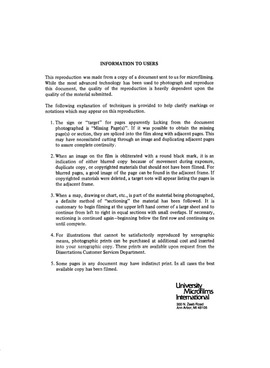| dc.contributor.author | Knapp, Michael Chris, | en_US |
| dc.date.accessioned | 2013-08-16T12:28:48Z | |
| dc.date.available | 2013-08-16T12:28:48Z | |
| dc.date.issued | 1982 | en_US |
| dc.identifier.uri | https://hdl.handle.net/11244/5068 | |
| dc.description.abstract | The focus of this study was upon the perceived independence of external auditors. A two-part research strategy was employed in studying this phenomenon. First, the relevance of several recommendations which have been brought before the auditing profession in recent years was systematically evaluated. The research interests in this case were (1) to determine how financial statement users would redefine the auditor's role to provide for a greater degree of independence, and (2) to determine how well partners of national accounting firms agree with users in this regard. The second approach involved examining a specific context identified in the literature as having the potential to seriously undermine the perceived independence of auditors, namely, auditor-client conflict episodes. | en_US |
| dc.description.abstract | With respect to the first part of the study, the loan officers expressed their view that several of the actions included in this study would be effective measures to employ in promoting the independence of auditors. Among these items were the disclosure of auditor-proposed adjustments not accepted by the client, the disclosure of significant disagreements between auditing firms and their clients, and the periodic rotation of audit engagement personnel. The partner subjects were more skeptical of the policies' effectiveness in promoting independence as they were in favor of the adoption of only one action, the mandatory use of audit committees. | en_US |
| dc.description.abstract | In the second part of the research, the two variables which were found to be the most significant determinants of perceived independence in conflict episodes were the client's relative financial condition and the degree of subjectivity required to interpret the focal issue of the dispute. Subjects believed that a financially healthy client would be more capable of inducing the auditing firm to accept their (the client's) preferred resolution to the dispute than in the situation where the client was in relatively poor financial condition. When the focal issue of the dispute concerned a topic not dealt with in an explicit manner by the technical standards of the profession, the subjects also perceived a moderate risk of the auditing firm capitulating to the client's wishes. | en_US |
| dc.format.extent | ix, 209 leaves : | en_US |
| dc.subject | Business Administration, Accounting. | en_US |
| dc.title | An integrative empirical analysis of auditor independence. | en_US |
| dc.type | Thesis | en_US |
| dc.thesis.degree | Ph.D. | en_US |
| dc.thesis.degreeDiscipline | Michael F. Price College of Business | en_US |
| dc.note | Source: Dissertation Abstracts International, Volume: 43-11, Section: A, page: 3633. | en_US |
| ou.identifier | (UMI)AAI8306722 | en_US |
| ou.group | Michael F. Price College of Business | |
